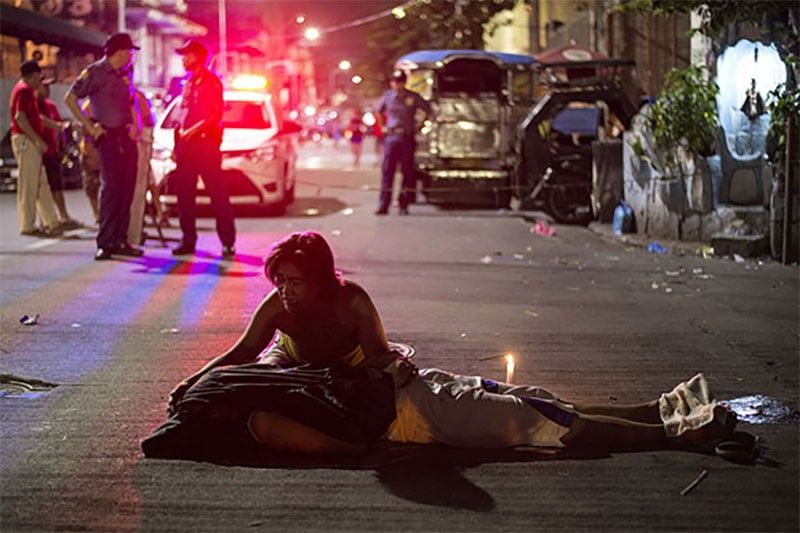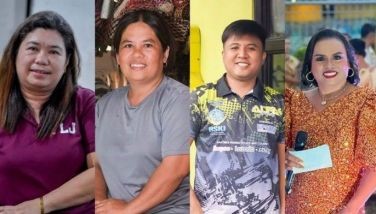‘No return to ICC despite findings by quad comm’

Bersamin: ICC won’t get quad report on drug war
MANILA, Philippines — Malacañang rejected yesterday proposals for President Marcos to submit a House quad committee report to the International Criminal Court (ICC), which is investigating the previous administration’s alleged atrocities in the war on drugs.
“The Philippines will not return to ICC. Based on this, the President is not expected to change his mind and not refer the quad comm matter to the ICC,” Executive Secretary Lucas Bersamin said in a statement.
In an interview with “Storycon” on One News yesterday, National Union of People’s Lawyers (NUPL) adviser and former Bayan Muna representative Neri Colmenares urged the Marcos administration to submit to the ICC the documents that were released during the quad committee hearings, including the affidavit of former Philippine Charity Sweepstakes Office general manager Royina Garma.
“Based on her revelations, she is a witness. The (ICC) prosecutor can use her (as a witness),” Colmenares said in Filipino. “The ICC case is reserved for highest officials committing the most serious crimes against humanity… Her testimony can of course be submitted to the ICC, it will be up to the ICC how to treat her.”
He noted the possibility, though, that Garma might remain a respondent even with the prosecutor using her testimony in the case.
Colmenares said Garma’s revelations have a significant implication in holding former president Rodrigo Duterte accountable in the widespread killings in connection with war on drugs.
“What colonel Garma said tied (the two elements of the crimes against humanity). He (Duterte) did not just order the killings, he ordered the initiation (of the drug war) using the Davao model. Secondly, he funded it,” said the former lawmaker.
In her testimony at the quad committee hearing last Friday, Garma bared details of the supposed plan of then president-elect Duterte to implement the drug war. She specifically provided details of the so-called Davao model, which was supposedly used to provide rewards or payments for the implementation of the drug war.
“She is an insider,” Colmenares said of Garma. “Her sworn statement can be used in the ICC, (on the case of) the crimes against humanity.”
In a statement, NUPL’s Krissy Conti urged Marcos “to submit the quad comm investigation materials to the ICC for inclusion in the prosecution’s case build-up on crimes against humanity committed in the Philippines.”
According to Conti, Garma’s testimony “establishes a pattern in the killings, and fingers the most responsible behind all the incidents.”
“Her statement ties up why all those senseless killings on the ground happened and, on another hand, why policemen are complicit and willful participants. Hers is a powerful testament to Duterte’s murderous schemes from Davao to the rest of the country that confirms other statements made by insiders. It is damning evidence and, hopefully, the first of many,” Conti said.
Garma, a retired police colonel, revealed the supposed cash reward system for policemen under a “Davao model” of the drug war during the Duterte administration. She alleged that policemen were rewarded with as much as P1 million per kill under the Davao template for the nationwide war on drugs.
In April, Marcos said his government would not hand over Duterte should the ICC issue an arrest warrant in relation to the deadly war on drugs.
Marcos said the ICC has jurisdiction only over countries with “no judicial system working, no police force functioning.” He also said he is not inclined to rejoin the ICC, since the Philippines justice system is working.
In 2019, the Philippines officially cut ties with the ICC after the international court launched a preliminary probe into the thousands of drug-related deaths during Duterte’s term.
SolGen: Refer findings to DOJ, Ombudsman
For Solicitor General Menardo Guevarra, it would be “better” for the House quad committee to turn over the evidence it found during the course of its hearings to the Department of Justice (DOJ) or Office of the Ombudsman, instead of to the ICC.
“It would be even better if all the evidence gathered from the congressional committee hearings were turned over to our own executive agencies for appropriate investigation and prosecution,” Guevarra said in a message to reporters.
He noted that it is the DOJ and the ombudsman that have the mandate “to build on the findings of the congressional committees with respect to criminal matters.”
Guevarra said the quad committee, on its own, can turn over the evidence and refer its initial findings to the either the DOJ or the ombudsman.
The role of the Office of the Solicitor General, he added, “will come in much later.”
Human rights groups as well as the National Council of Churches in the Philippines (NCCP) are calling on the government to grant the ICC access to witnesses and testimonies made during the quad committee hearings on extrajudicial killings.
The NCCP said it is deeply concerned and in indignation over Garma’s revelation of a reward system, adding that Garma’s testimony corroborated the testimonies of other witnesses and confirms an “open secret” that the killings “were state-sponsored, planned, committed and funded by the state authorities.”
“Let justice be served and may the responsible author behind the killings and human rights violations in the ‘War on Drugs’ in the Philippines be held accountable. The current administration should also ensure that extrajudicial killings must not continue and human rights prevail,” the NCCP said.
The religious organization also hopes that legislators would plug loopholes in the law that is being used to justify the syndicated killings.
Earlier, the DOJ said it would launch a preliminary investigation into cases of high-profile killings committed during the Duterte administration. These include the 2016 deaths of three Chinese drug lords at the Davao Prison and Penal Farm, the murder of PCSO executive Wesley Barayuga, the killing of Tanauan Mayor Antonio Halili and the death of Albuera, Leyte mayor Rolando Espinosa.
Justice Undersecretary Raul Vasquez in a statement said that the DOJ would begin the investigation and case build-up once Congress submits its committee report along with affidavits, or if a formal complaint is filed.
Vasquez said the police or private individuals could file the complaint and the DOJ will launch a probe as long as there is an “initiatory process.”
Interior Secretary Jonvic Remulla said he would wait for the final recommendation of the quad committee.
“The testimonies are not over yet. So, as far as I am concerned, we will wait until all the testimonies are in. We will wait until the appropriate actions are done but initial work is already being conducted but only to that extent. We will wait until Congress is finished and we will act on it,” Remulla said at a press conference.
He added that there would be no sacred cows in the investigations of the Department of the Interior and Local Government (DILG) and the Philippine National Police (PNP).
“Anyone who is found guilty will be treated like any other person. They will be accorded no special treatment. They will be accorded no special privileges. Everyone will face the full consequence of the law and the powers of the PNP, the institutions and the DILG,” Remulla said.
Sen. Ronald dela Rosa expressed approval for the PNP to launch its own fact-finding investigation into Garma’s claim of a payment and rewards system for killing drug suspects.
Dela Rosa, first PNP chief during the Duterte administration, maintained he has no knowledge of Garma’s allegations of a “Davao model” in the anti-drug campaign. — Daphne Galvez, Evelyn Macairan, Bella Cariaso, Cecille Suerte Felipe
- Latest
- Trending






























